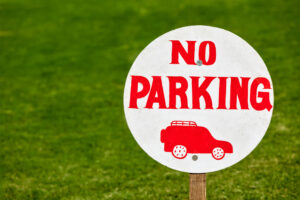As I’ve mentioned before, I currently live in Minnesota. Like most places I’ve lived, it has its upsides and downsides, but one thing I put firmly in the “upside” category is the Minnesota State Fair. This event occurs in the final days before summer ends and the school season begins. While scrolling through the local news, I stumbled across an opinion piece with what struck me as a strange take on fair parking.
Parking at the fair can certainly be an ordeal. It attracts large crowds and there is only so much parking space and only so many streets one can take to get there, so the last leg of the drive to the fair is often spent moving at barely faster than walking speed while getting into the parking lot. The official state fair parking lots charge a $20 fee. In theory, street side parking is available in various neighborhoods within walking distance of the fairgrounds. But, because these street side parking spaces are available to use free of charge, they reach capacity approximately instantaneously and finding one requires a great deal of luck. Personally, I’ll cheerfully pay $20 to skip that process and park at the fairgrounds. The amount of time and hassle I save is worth significantly more than $20 to me – which will be even more true this year, since my three-year-old son will be coming along for the experience.
The author of this piece, however, takes a different view. For him, its either free street side parking or nothing at all. He calls this his “biggest tradition” regarding the fair. Now, I’m not going to say he’s wrong for harboring this preference. Economic value is subjective, and just because the time and hassle saved by using fairground parking is worth $20 to me doesn’t mean it must be worth $20 to him. However, I think his opinion would benefit if he took certain externalities into account.
He does seem at least partly aware of one externality associated with his parking preference – the time and hassle costs of fulfilling his parking preferences are also inflicted on the other people joining him to this event. He acknowledges this issue exists, commenting how his behavior “drives my friends and family accompanying me to the fair nuts: I will drive around for a looooooong time through the neighborhoods to find a free parking spot. This is a game I am not willing to lose.” But even though he’s aware that fulfilling this preference inflicts costs on the other members of his party, he doesn’t seem too troubled by that.

However, there’s another externality going on that he also fails to properly appreciate. He points out that some “enterprising individuals who live adjacent to the grounds” will also, for a fee, allow state fair attendees to park in their driveways or even on their lawns. I think this is a great thing. Parking is a scarce resource, and during the state fair the quantity of parking demanded is unusually high, and local residents are responding to this by increasing the parking supply since they can charge a price for the use of that resource. Unfortunately, it’s clear that when he refers to these people as “enterprising individuals” his intention is full of sarcasm and scorn – he also refers to these people as “clowns” immediately afterwards.
I think his disdain for these people is uncalled for. Some people have extra space that can be used, others are happy to pay to use that space, and this is a mutually beneficial exchange for all parties involved. If he doesn’t find that it’s worth it for him, that’s fine, but sneering at people who do find it beneficial is a bad look. But even if he has no wish to partake, he should be grateful these arrangements exist – they work to his benefit. Every person who uses these spaces to park is one less person out there looking for street side parking. The more people are willing to allow their driveways and lawns and lots be used for fair parking, the more it improve his odds to find some of the street side parking he values so much. The very thing he scoffs at and looks down upon also creates a positive externality from which he benefits. Perhaps if he took the insights of economics a little closer to heart, his attitude towards other people would be a little less dismal.


READER COMMENTS
Richard W Fulmer
Aug 29 2023 at 1:11pm
In addition to being indifferent to his passengers’ opinions and to the value of their time, the author of the piece appears to be ignorant of basic economics. That’s fine. We’re all rationally ignorant in countless areas. I know nothing about micropaleontology and have no need or desire to address that gaping hole in my education.
Moreover, the author wasn’t demanding that the local zoning commission prohibit homeowners from renting out parking spots on their lawns. I resent people who, unlike the author, insist on trying to enact their ignorance into law. I especially resent it when such people are legislators. Public officials have a responsibility to educate themselves before offering either opinions or legislation.
Unfortunately, good policy too often takes a backseat to good politics. That’s why I’m happy that the Constitution and its amendments put many of my freedoms beyond the reach of the ballot box – I only wish that more of my freedoms were similarly protected.
Henri Hein
Aug 29 2023 at 1:49pm
In the Bay Area, parking at the airports is notoriously expensive. When I lived there, my house was remote and a shuttle was not cost-effective. Looking around for alternatives, I discovered people living in neighborhoods close to the airports offered space in their driveways. Many of them even offered a “limo service,” though I had a feeling it was just going to be a retiree giving me a ride in his Kia. As economics would predict, the prices were close to that of the off-site parking businesses, and booking was a little harder, so I ended up never making use of one of these. I liked how they fulfilled a need, though.
Thomas L Hutcheson
Aug 29 2023 at 6:02pm
One should not have to wait for a special event. demand for different parking spots differ from place to place, day to day, and time to time. A smart ste of parking would price spots so that one would always have a reasonably shot at finding a spot. This would not only save everyone the hassle of looking for a parking spot, but reais revenue for the city.
Ditto river water in the southwest.
Ditto ground water everywhere
Ditto road and street use by moving vehicles
Ditto the atmosphere for CO2 emissions
Mispricing scarce resources leads to problems and missed opportunities.
nobody.really
Aug 30 2023 at 3:16pm
I wonder if perhaps Kevin Corcoran has missed the author’s point.
To the author, hunting for a free parking space is a SPORT. A person who takes pride in his skill at hunting deer in the wild might well sneer at people who would shoot deer in a pen. And if I were to say to the hunter, “Hey, the deer meat and the trophy is all the same, whether in the wild or in a pen, right?” I don’t think I’d persuade him to change his point of view.
Comments are closed.